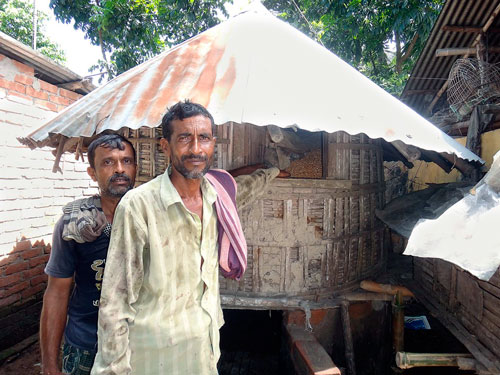Farmers in Chuadanga District of Bangladesh have been using a unique local method to store their maize: the gola.
Maize grains can be stored in a modified gola for several months. Photo: Abdul Momin-CIMMYTGolas are large rectangular or cylindrical containers used to store seed and animal feed. In Bangladesh, golas are traditionally used to store paddy rice. They are made locally using bamboo for the sides and tin for the roof, can last up to 80 years and hold from 2 to 20 tons of grain.
Many Bangladeshi farmers believe that, unlike rice, maize grain cannot be stored in golas due to its high susceptibility to insects and pests. To keep its quality from deteriorating, farmers normally sell maize grain at a minimum price as quickly as possible after harvest.
Unlike most of the country’s farmers, Chuadanga farmers use golas to store maize grain until its market price goes up, which results in higher profits. According to a recent CIMMYT-Bangladesh survey, the longer they store the seed, the higher the profit. “The profit earned by the Chuadanga farmers through maize grain storage helps to increase the national per capita income, allowing Bangladesh to become a middle income country,” said Prodip Hajong, Senior Officer in Agricultural Economics at the Bangladesh Agricultural Research Institute (BARI).
Eighty percent of all maize grain produced in Chuadanga is stored anywhere from 4 to 43 weeks and sold for a higher price. According to the survey, golas were the preferred storage for maize and used by over 60% of respondent households. Each household earned a profit of approximately USD $389.68 in 2012, USD $315.64 in 2013 and USD $130.19 in 2014. During 2014, the overall market price of maize grain was low compared to previous years; that is why farmers’ profit margin was comparatively small.

“High temperatures inside the gola help maintain grain quality by killing insects, their larvae and eggs,” said Abdul Momin, CIMMYT Cropping Systems Agronomist. With assistance from the Cereal Systems Initiative in South Asia in Bangladesh (CSISA-BD) project, Chuadanga farmers have been modifying their golas – for example, by reinforcing the floors with tin to prevent post-harvest losses from rodents and insects – so that they can store maize for longer periods.
The CIMMYT-Bangladesh survey was conducted by CIMMYT researchers Frederick Rossi, Agricultural Economist; Elahi Baksh, Applied Agricultural Economist; Abdul Momin, Cropping System Agronomist; Thakur P. Tiwari, Country Representative in Bangladesh and Prodip Hajong, Senior Officer in Agricultural Economics at BARI. They recommended making an action plan in collaboration with the Department of Agricultural Extension, BARI and local NGOs, to demonstrate and disseminate this low cost technology throughout the country.
 Innovations
Innovations